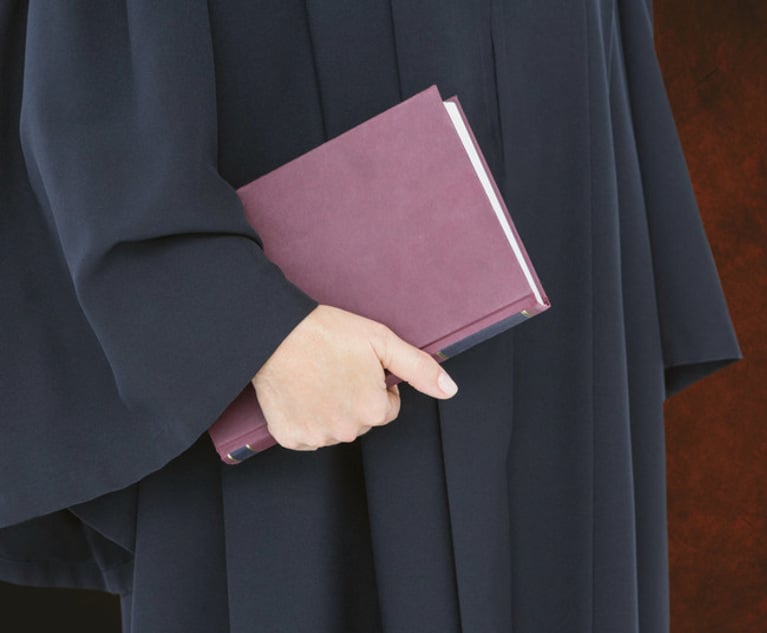 Judge Steve Goss, Georgia Court of Appeals. (Photo: John Disney/ALM)
Judge Steve Goss, Georgia Court of Appeals. (Photo: John Disney/ALM)Questions for the Bench: Judge Steve Goss of the Court of Appeals
"If the case was flawless, it likely would not be in a courtroom. I prefer that counsel tell me up front why the facts or law may be distinguishable and why their client should prevail."
February 14, 2019 at 12:06 PM
6 minute read
By definition, judges play a huge role in the legal community, so we want to know as much as possible about them. Part of this effort includes a series we're calling “Questions for the Bench,” in which we'll ask judges to answer about a dozen questions about their jobs, their backgrounds, their preferences for how lawyers present cases, and other matters.
Judge Stephen Goss of the Court of Appeals, who was elevated from a Superior Court last year, agreed to be our first subject. Here are our questions and his answers:
Judge's Name: Stephen S. Goss (although I have always been “Steve”)
Court: Court of Appeals of Georgia
Number of years on the bench: 24 (judge of Juvenile Court, Dougherty Judicial Circuit, 1995-1999; judge, Superior Court, Dougherty Judicial Circuit, 1999-2018; judge, Court of Appeals of Georgia, 2018-present).
1. What do you like most about being a judge? As a trial judge, I liked being able to help resolve disputes and guide persons to make positive life changes. I started the felony mental health and co-occurring substance abuse treatment court in Albany in 2002, and that work has been a career passion. I continue to assist drug and mental health court teams around the country on training and education matters. In my new role as an appellate judge, I like being able to use my years of experience as a trial lawyer and trial judge to seek to apply practical views to the substantive laws and their consistent application statewide.
2. What keeps you up at night as a judge? Like most trial judges (or former trial judges) will tell you, the cases involving children are typically the ones we struggle with the most emotionally, whether it be custody disputes or criminal cases involving child victims.
3. What are your pet peeves in briefs and arguments? I cannot say that I have a pet peeve on this topic. Conversely, what I appreciate the most are briefs that are focused and advocates that are prepared and candid. If the case was flawless, it likely would not be in a courtroom. I prefer that counsel tell me up front why the facts or law may be distinguishable and why their client should prevail. Lead with your strongest arguments and acknowledge and distinguish your weaknesses.
4. What characteristics do successful advocates before you share? Clarity, candor and preparation.
5. When making a decision, do you tend to imagine the answer and then look for legal reasoning to support that answer, or do you follow the legal reasoning to a particular conclusion? I try to ascertain the law and let the law drive the decision. If a particular set of facts in a case falls somewhere between two lines of prior appellate decisions, then I try to discern where the case in front of me falls in the spectrum between the prior cases.
6. If you have an inkling about how you'll rule on a question before hearing oral argument, how often does oral advocacy change your mind? I have reviewed the briefs, the trial court order and the record before I hear oral appellate arguments. If I ask a question, it is usually because I am confirming or clarifying something I have read or because it is the issue that is causing me concern. There are times when the attorney clarifies or emphasizes a point in response that can have an impact on how I analyze the merits of the case.
7. What U.S. Supreme Court justice who served in the past 20 years would you like to emulate and why? My response is not driven by any judicial philosophy but rather by actions. I appreciate Chief Justice John Roberts' approach to the administration of the court. It is clear, whether one agrees or disagrees with his jurisprudence, that Chief Justice Roberts cares deeply about the United States Supreme Court as an institution and as a third branch of government. The federal and state court systems across the country should be rightly perceived as neutral and places where all persons stand equal before the law. It is the very nature of contested litigation that some persons will not like the outcomes of cases. However, we should strive for procedural fairness where it is clear that due process is afforded and that litigants were given the opportunity to be heard within the bounds of our laws.
8. What is your approach to stare decisis? Under what circumstances would you vote to overturn a precedent?
I am a believer in stare decisis. I believe in consistency and stability in the law and in life. This is important, not only for trial lawyers but also attorneys that advise business and real estate clients and for lawyers that focus on tax and estate planning. Lawyers need to know what the laws are, and likely will be, when advising a client in any number of settings. Without taking a fixed, prejudged position on what particular circumstances would lead me to vote to overturn a case, I will give an example of when such action has occurred in the past. There were two lines of prior appellate decisions that resulted in inconsistent outcomes in factually similar cases. A vote was cast to overturn a prior decision in order to avoid inconsistent results.
9. How would you describe the role of the judicial branch in the separation of powers? The legislative and executive branches make and execute policy decisions, not the courts. As judges, our role is to interpret the laws, not create them. The judicial branch has the express authority and, in some instances, inherent authority to supervise the administration of the court system.
10. What are you views regarding the use of nonprecedential opinions, such as unpublished opinions and judgment-only concurrences, in the Court of Appeals? I believe these opinions have their place. There are some cases that we review where the body of law is really clear and established. Publishing the 100th case on the standard for evaluating a summary judgment motion really adds nothing to the body of law in the state. As far as judgment-only concurrences, the judges discuss and try to resolve, where possible, differing views about a record and the applicable law. Sometimes judges just interpret things slightly differently. The concurring judge may agree with the case outcome, but not all of the majority's legal analysis. In that instance, I deem a concurrence in judgment only to be a viable option.
This content has been archived. It is available through our partners, LexisNexis® and Bloomberg Law.
To view this content, please continue to their sites.
Not a Lexis Subscriber?
Subscribe Now
Not a Bloomberg Law Subscriber?
Subscribe Now
NOT FOR REPRINT
© 2025 ALM Global, LLC, All Rights Reserved. Request academic re-use from www.copyright.com. All other uses, submit a request to [email protected]. For more information visit Asset & Logo Licensing.
You Might Like
View All


North Carolina Courts Switch to Digital, Face Extreme Weather in 2024
Trending Stories
Who Got The Work
Michael G. Bongiorno, Andrew Scott Dulberg and Elizabeth E. Driscoll from Wilmer Cutler Pickering Hale and Dorr have stepped in to represent Symbotic Inc., an A.I.-enabled technology platform that focuses on increasing supply chain efficiency, and other defendants in a pending shareholder derivative lawsuit. The case, filed Oct. 2 in Massachusetts District Court by the Brown Law Firm on behalf of Stephen Austen, accuses certain officers and directors of misleading investors in regard to Symbotic's potential for margin growth by failing to disclose that the company was not equipped to timely deploy its systems or manage expenses through project delays. The case, assigned to U.S. District Judge Nathaniel M. Gorton, is 1:24-cv-12522, Austen v. Cohen et al.
Who Got The Work
Edmund Polubinski and Marie Killmond of Davis Polk & Wardwell have entered appearances for data platform software development company MongoDB and other defendants in a pending shareholder derivative lawsuit. The action, filed Oct. 7 in New York Southern District Court by the Brown Law Firm, accuses the company's directors and/or officers of falsely expressing confidence in the company’s restructuring of its sales incentive plan and downplaying the severity of decreases in its upfront commitments. The case is 1:24-cv-07594, Roy v. Ittycheria et al.
Who Got The Work
Amy O. Bruchs and Kurt F. Ellison of Michael Best & Friedrich have entered appearances for Epic Systems Corp. in a pending employment discrimination lawsuit. The suit was filed Sept. 7 in Wisconsin Western District Court by Levine Eisberner LLC and Siri & Glimstad on behalf of a project manager who claims that he was wrongfully terminated after applying for a religious exemption to the defendant's COVID-19 vaccine mandate. The case, assigned to U.S. Magistrate Judge Anita Marie Boor, is 3:24-cv-00630, Secker, Nathan v. Epic Systems Corporation.
Who Got The Work
David X. Sullivan, Thomas J. Finn and Gregory A. Hall from McCarter & English have entered appearances for Sunrun Installation Services in a pending civil rights lawsuit. The complaint was filed Sept. 4 in Connecticut District Court by attorney Robert M. Berke on behalf of former employee George Edward Steins, who was arrested and charged with employing an unregistered home improvement salesperson. The complaint alleges that had Sunrun informed the Connecticut Department of Consumer Protection that the plaintiff's employment had ended in 2017 and that he no longer held Sunrun's home improvement contractor license, he would not have been hit with charges, which were dismissed in May 2024. The case, assigned to U.S. District Judge Jeffrey A. Meyer, is 3:24-cv-01423, Steins v. Sunrun, Inc. et al.
Who Got The Work
Greenberg Traurig shareholder Joshua L. Raskin has entered an appearance for boohoo.com UK Ltd. in a pending patent infringement lawsuit. The suit, filed Sept. 3 in Texas Eastern District Court by Rozier Hardt McDonough on behalf of Alto Dynamics, asserts five patents related to an online shopping platform. The case, assigned to U.S. District Judge Rodney Gilstrap, is 2:24-cv-00719, Alto Dynamics, LLC v. boohoo.com UK Limited.
Featured Firms
Law Offices of Gary Martin Hays & Associates, P.C.
(470) 294-1674
Law Offices of Mark E. Salomone
(857) 444-6468
Smith & Hassler
(713) 739-1250







